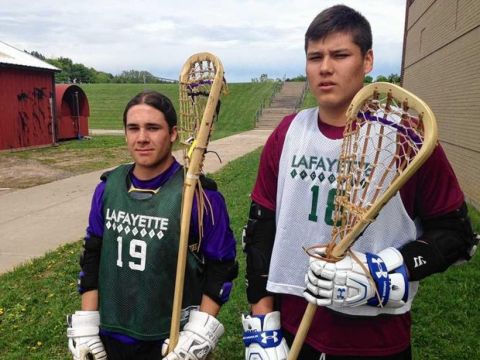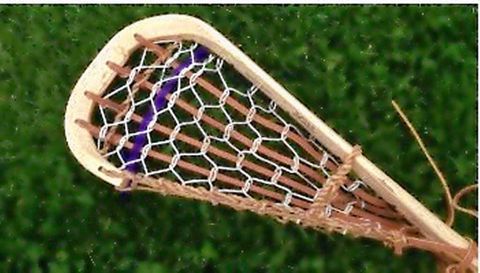 |
Canku Ota
|
 |
|
(Many Paths)
|
||
|
An Online Newsletter
Celebrating Native America
|
||
|
June 2015 - Volume 13
Number 6
|
||
|
|
||
|
LaFayette Players
Bust Out The Wooden Lacrosse Sticks, Even For Lancers Games
|
||
|
by Donnie Webb - Syracuse.com
|
||
Defensive midfielder Emerson Shenandoah of the LaFayette High School lacrosse team wields the elegant, hand-carved piece of hickory like a scepter during a Friday afternoon practice. He effortlessly extends the "woody" into passing lanes, intercepting balls or knocking them down. In drills, he scoops up ground balls and flicks accurate passes to teammates on the fly. Running down field carrying the ball is another matter. Shenandoah admits the stick is so heavy, he can't feel the ball in his crosse. If it fell out, Shenandoah says he'd keep on running, oblivious to his lost treasure. But there's no missing the pieces of history and tradition that are making an appearance this season at LaFayette. In a world of high-tech plastics and metal shafts, Shenandoah and teammate Percy Booth have broken out wooden, traditional lacrosse sticks - in high school games. The sticks they are using were crafted by renowned stick-maker Alf Jacques of the Onondaga Nation. They are made from a single piece of hickory harvested from the Onondaga Nation, then carved, shaped and bent so they can be fitted with a pocket of rawhide and nylon. There is a signature purple shooting string that represents the wampum and Iroquois nation. The "woodies," as they're called by the players, look like works of art. But they're being used in Syracuse area high school games, perhaps for the first time in decades. LaFayette High School coach Mike Riese said the use of wooden sticks in the high school game is legal as long as they meet the rules. Booth has used his wooden stick in LaFayette games against Baldwinsville and Onondaga this season. He scored a goal in one of the games. Shenandoah is using a longer, defensive stick that he borrowed from Kevin Bucktooth, a member of the Iroquois National team. Shenandoah said he's using the heavier wooden pole in practice to get a feel for the different stick. He's brought it along to LaFayette games but says the width of the hand-carved top is a half-inch too wide, making it illegal for high school games. They may be present on Wednesday when LaFayette meets CBA in a Class C Section III playoff game. Their presence has already brought pride to the Onondaga Nation. "I think it's great," said Jacques, who says there's a year's wait to get one of his sticks and calls the demand, overwhelming. "It makes me proud that these young men wanted to go back to the wood. It’s part of tradition here, part of the culture, part of lacrosse's roots that come out of Onondaga."
But there is a different weight that Shenandoah and Booth carry when using the wooden sticks. They welcome the opportunity to bring honor to the creator's game by playing with a wooden stick. There is an enormous connection with their heritage and their identity as Onondaga. "It's part of our tradition. Something we've played with forever," said Shenandoah. "It makes you feel a little closer to the game." "It was pretty awesome," Booth said of the goal he scored using the wooden stick. "The ref said I was the first one he'd ever seen try and use one." Jacques said he played with a wooden stick at LaFayette High School in the 1960s. He said they disappeared in 1974 with the arrival of plastic sticks and metal shafts. He said there were the occasional wooden stick still popping up until around 1993, but said he knows of no high school player using one since Booth and Shenandoah this season. The wooden stick Booth is using was custom made for a left-hander and to fit high school regulations. Booth said he took offense to implications the sticks were "weapons" during the World Lacrosse Championships last summer in Denver. Some members of the Iroquois Nationals used the wooden sticks, though not without controversy. There were several penalties called against the Iroquois for slashing. Bucktooth was called for three penalties in a loss to Canada and had to switch to the conventional stick. "I wanted to show they can be used to score," Booth said, " because I'm a goal scorer." The wooden sticks can cost more than $300. When Booth shot during
Friday's practice, his follow-through clanged into the stick of
a defender. Another player piped up immediately, "Aren't you
worried about breaking it?"
The players say the sticks are nearly indestructible. They also carry a little more pain when checking. "It's more solid, so it hurts," Shenandoah said. Booth and Shenandoah both said they feel something spiritual using the sticks. They've used wooden sticks since they were children. Onondaga men are often buried with their sticks as well. Shenandoah said he hopes to use his wooden stick more in the future. Booth said he's already made a point this season. "I was just trying to use it, show people we've still got 'em, still use them," Booth said. "We use them in the box lacrosse game. but We don't get to use them in field. That's where most people see us play. So it was a pretty great experience." |
||||
|
|
||
|
|
||
| Canku Ota is a free Newsletter celebrating Native America, its traditions and accomplishments . We do not provide subscriber or visitor names to anyone. Some articles presented in Canku Ota may contain copyright material. We have received appropriate permissions for republishing any articles. Material appearing here is distributed without profit or monetary gain to those who have expressed an interest. This is in accordance with Title 17 U.S.C. Section 107. | ||
|
Canku Ota is a copyright ©
2000 - 2015 of Vicki Williams Barry and Paul Barry.
|
||
 |
 |
|
|
The "Canku
Ota - A Newsletter Celebrating Native America" web site and
its design is the
|
||
|
Copyright ©
1999 - 2015 of Paul C. Barry.
|
||
|
All Rights Reserved.
|
||

